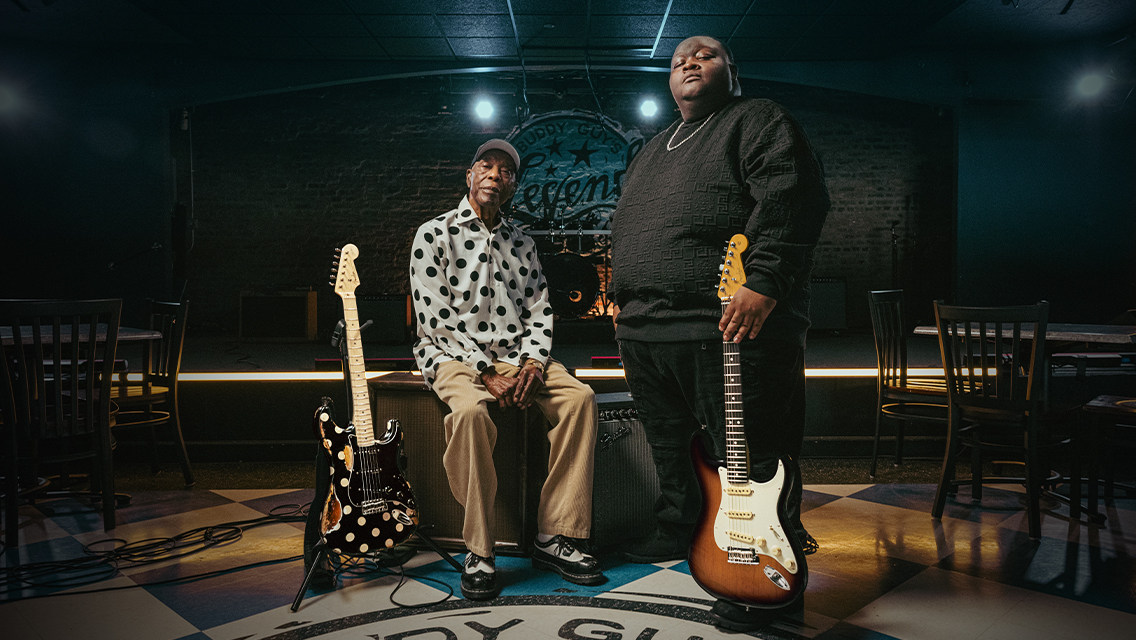3 Min ReadBy Ian Fowles
The Muse Speaks: Do Songs Live Inside Your Guitar?
Songwriting inspiration can come at any time, from anywhere. But some artists think it's the instrument that holds the key to creativity.

Sections
Where do songs come from?
This question has plagued musicians and songwriters for centuries.
How does inspiration work? Are song ideas floating in the ether above our heads just waiting to be pulled down and written? Is there a best time or place to write a song? Do great songs come slowly over time, or all at once? What rituals can someone perform to help coax the muse to speak?
Many artists have given their own ideas of how this enigmatic process works. Bob Dylan said he needs a type of peaceful and invigorating environment to free up his mind. Filmmaker/musician David Lynch advocates for transcendental meditation to spark great creative ideas.
Talking Heads frontman David Byrne, however, takes a more practical, concrete approach. He feels the commonly held ideas of inspiration are too romantic and we are actually largely trapped by the contexts we live in and spaces in which we perform songs. In his 2012 book, How Music Works, Byrne writes that we are creatively opportunistic and “instinctively make work to fit preexisting formats” and “the venue available to us,” effectively removing some of the magic many people like to associate with pure inspiration.
While Byrne’s ideas may be true, legendary singer/songwriter Leonard Cohen tended to embrace the dimension of spiritual wonder that can attend songwriting. Cohen spent decades honing his craft and released over 130 songs before his passing in 2016. He admitted that searching for inspiration is a lifelong passionate quest. “If I knew where the good songs came from, I’d go there more often," he says in Paul Zollo's 2003 book, Songwriters on Songwriting. "It’s a mysterious condition. It’s much like the life of a Catholic nun. You’re married to a mystery.”
At least one other theory has been put forth that attempts to unravel some of the secrets of good songwriting: that there are songs living inside guitars.
Many guitarists and artists speak about picking up a new or different instrument and immediately writing a great song with it. Perhaps it's an old guitar they found tucked away in an attic or on a dusty rack at a pawn shop. Maybe it is that brand-new guitar they saved up to buy. Regardless of the origin, there is definitely something tangible that happens when a player picks up a new guitar that feels and sounds different than one they're used to.
Johnny Marr talks about this in his recent 2016 autobiography, Set The Boy Free. He tells the story of his band, the Smiths, signing to Sire Records, and label head Seymour Stein then taking Johnny out guitar hunting in New York City to seal the deal. They eventually went into a shop called We Buy Guitars where a special guitar seemed to beckon him from the window.
Marr recalls, “I knew the guitar was special before I even touched it. Seymour bought the guitar for me, and I carried it back to the Iroquois Hotel on West 44th Street. When I got to my room, I took my new (guitar)out of its old, beat-up case, and with the very first thing I played I wrote our next single, ‘Heaven Knows I’m Miserable Now’, then the B-side, ‘Girl Afraid’. That’s what happens with some instruments, they already have music inside them.”
Sometimes all it takes is a fresh perspective, a different neck shape, different pickup configuration or a different scale length to nudge a guitarist into a new creative zone. Some artists say that the best songs they write come quickly and fairly complete, and that sometimes it’s just a new guitar that is the impetus for a burst of great songwriting.
Brett Gurewitz agrees. As guitarist of Los Angeles punk pioneers Bad Religion and founder/owner of Epitaph Records, he has written, played and produced on dozens of his and other artists’ albums.
In a 2011 interview with Nic Harcourt, Gurewitz explains, “I judge guitars by how many new songs they have in them. When I get a new guitar, I usually get a new song out of it right away as soon as I get home, and sometimes I’ll even get two or three new songs just like that. Each guitar feels and sounds a little different than the other ones, so it makes me play a little bit differently, which leads to me coming up with new songs. Each guitar is like a new friend or a new writing partner.”
Whether or not songs are actually hiding inside guitars or the songwriter is just reacting to the feel of a different instrument is hard to tell. Either way, there is a magic that comes from experimenting on new and different guitars. Even if it’s not the catalyst for writing the next big hit, the process at least helps a guitarist find out what guitars they prefer, or are best suited for them. And being comfortable with a certain guitar in itself can lead to the desire to play it more, potentially leading to more songs being written with it.
So always continue exploring new guitars, because perhaps a new song is hiding inside the next guitar you try, just waiting for you to bring it out and share it with the world.
Don’t miss out!
Be the first to know about new products, featured content, exclusive offers and giveaways.


